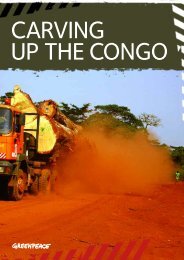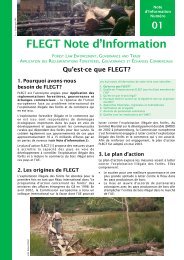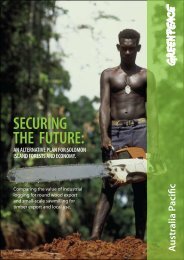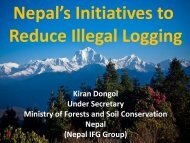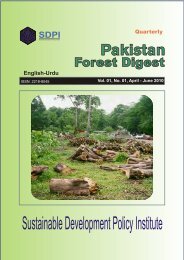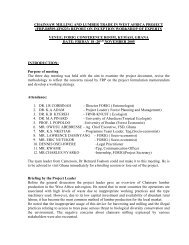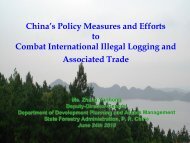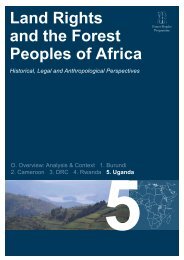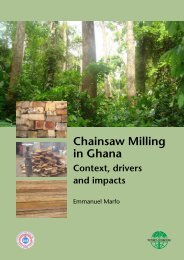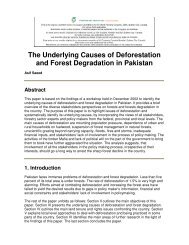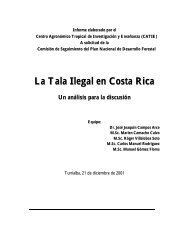conflict over natural resources at the community level in nepal
conflict over natural resources at the community level in nepal
conflict over natural resources at the community level in nepal
Create successful ePaper yourself
Turn your PDF publications into a flip-book with our unique Google optimized e-Paper software.
• Donors and NGOs are teach<strong>in</strong>g medi<strong>at</strong>ion techniques to villagers to allow <strong>the</strong>m to medi<strong>at</strong>e disputes <strong>in</strong><strong>the</strong>ir communities (e.g., <strong>the</strong> Asia Found<strong>at</strong>ion conducted a village-<strong>level</strong> medi<strong>at</strong>ion tra<strong>in</strong><strong>in</strong>g program withUSAID fund<strong>in</strong>g).• Village Development Committees (VDC) and District Development Councils (DDC) are legallyempowered to resolve certa<strong>in</strong> types of <strong>conflict</strong>s, but <strong>the</strong>se bodies were disbanded <strong>in</strong> 2002 (g<strong>over</strong>nmentefforts to reelect DDC members <strong>in</strong> early 2006 were widely boycotted).• Sectoral officials, such <strong>at</strong> <strong>the</strong> District Forest Officer (DFO) and <strong>the</strong> District Irrig<strong>at</strong>ion Officer (DIO), areempowered to resolve <strong>conflict</strong>s <strong>in</strong> <strong>the</strong>ir technical areas but <strong>the</strong>se officials are often seen by <strong>the</strong> users asbe<strong>in</strong>g too self-<strong>in</strong>terested to render an unbiased judgment.• Rural people sometimes turned to <strong>the</strong> police to settle <strong>conflict</strong>s but most rural police posts are closed.• District courts are seen as a last resort for <strong>conflict</strong> resolution because us<strong>in</strong>g <strong>the</strong> courts are too expensivefor most people, legal cases often drag on for years, and judges are viewed as be<strong>in</strong>g partial to <strong>the</strong>ir ownethnic group and/or corrupt.• Maoist leaders provide an altern<strong>at</strong>ive system of <strong>conflict</strong> resolution, <strong>in</strong> which a decision is made on <strong>the</strong>spot based on a hear<strong>in</strong>g of both sides <strong>in</strong> <strong>the</strong> <strong>conflict</strong> or dispute.4.2 LAYING THE GROUNDWORK FOR THE END OF ARMED CONFLICT ANDREESTABLISHMENT OF DEMOCRACYThe <strong>in</strong>surgency has constra<strong>in</strong>ed <strong>the</strong> expression of <strong>community</strong>-<strong>level</strong> <strong>n<strong>at</strong>ural</strong> resource <strong>conflict</strong> because peoplefear call<strong>in</strong>g <strong>at</strong>tention to <strong>the</strong>mselves through open <strong>conflict</strong>. A portion of <strong>the</strong> potential disputants have simplyfled from <strong>the</strong>ir home villages. When <strong>the</strong> <strong>in</strong>surgency ends, and people return home and resume <strong>the</strong>ir normal<strong>n<strong>at</strong>ural</strong> resource use p<strong>at</strong>terns, <strong>the</strong>y may f<strong>in</strong>d <strong>the</strong>mselves <strong>in</strong> a situ<strong>at</strong>ion where pre-<strong>in</strong>surgency <strong>conflict</strong>management mechanisms are no longer effective. If <strong>the</strong> <strong>in</strong>surgency cre<strong>at</strong>es a social and politicaltransform<strong>at</strong>ion, a major driv<strong>in</strong>g force beh<strong>in</strong>d much of <strong>the</strong> <strong>conflict</strong> would be removed, mak<strong>in</strong>g wayfor <strong>the</strong> evolution of new <strong>conflict</strong> management mechanisms. If, however, <strong>the</strong>re is a return to <strong>the</strong>st<strong>at</strong>us quo, but with <strong>the</strong> traditional mechanisms rendered <strong>in</strong>effective, escal<strong>at</strong><strong>in</strong>g <strong>conflict</strong> <strong>over</strong> <strong>n<strong>at</strong>ural</strong><strong>resources</strong> could help push <strong>the</strong> country back toward ano<strong>the</strong>r cycle of armed violence.A view commonly expressed by <strong>in</strong>terviewees dur<strong>in</strong>g this assessment, and affirmed by <strong>the</strong> authors of several of<strong>the</strong> documents we consulted, is th<strong>at</strong> end<strong>in</strong>g <strong>the</strong> Maoist <strong>in</strong>surgency and reestablish<strong>in</strong>g a workable form ofdemocracy will require tak<strong>in</strong>g mean<strong>in</strong>gful steps to address <strong>in</strong>stitutionalized social discrim<strong>in</strong><strong>at</strong>ion and controlrampant corruption <strong>in</strong> g<strong>over</strong>nment (which reflects and re<strong>in</strong>forces <strong>the</strong> system of social discrim<strong>in</strong><strong>at</strong>ion). Simplyre<strong>in</strong>stitut<strong>in</strong>g democracy without chang<strong>in</strong>g underly<strong>in</strong>g <strong>at</strong>titudes, reflected <strong>in</strong> <strong>the</strong> way th<strong>at</strong> <strong>the</strong> political partiesoper<strong>at</strong>ed <strong>in</strong> <strong>the</strong> past, will not be effective. No one we talked with offered a plan for achiev<strong>in</strong>g this social andpolitical transform<strong>at</strong>ion, but most felt th<strong>at</strong> change <strong>in</strong> rural villages is a good place to start, given <strong>the</strong> currentpolitical impasse <strong>at</strong> <strong>the</strong> n<strong>at</strong>ional <strong>level</strong>. Maoist de facto control of most rural areas presents a serious obstacle tooutside <strong>in</strong>tervention <strong>at</strong> <strong>the</strong> village <strong>level</strong>, mak<strong>in</strong>g it difficult to offer political or development altern<strong>at</strong>ives.With VDCs and DDCs disbanded, <strong>n<strong>at</strong>ural</strong> resource user groups are <strong>the</strong> only democr<strong>at</strong>ically elected<strong>in</strong>stitutions th<strong>at</strong> cont<strong>in</strong>ue to oper<strong>at</strong>e <strong>in</strong> rural areas. G<strong>over</strong>nment officials are largely prevented from travel<strong>in</strong>goutside district capitals, so <strong>the</strong>re is virtually no g<strong>over</strong>nment presence <strong>in</strong> most rural areas. While <strong>the</strong> majority ofIWUAs and CFUGs suffer from elite capture, <strong>the</strong>se <strong>in</strong>stitutions rema<strong>in</strong> <strong>the</strong> most promis<strong>in</strong>g means toimprove <strong>the</strong> livelihoods of <strong>the</strong> poor, to demonstr<strong>at</strong>e <strong>the</strong> pr<strong>in</strong>ciple of equal access to <strong>resources</strong>, and to developa grassroots understand<strong>in</strong>g of democracy upon which to rebuild democr<strong>at</strong>ic <strong>in</strong>stitutions <strong>in</strong> <strong>the</strong> country.USAID’s Fragile St<strong>at</strong>es Str<strong>at</strong>egy po<strong>in</strong>ts out th<strong>at</strong>:16 CONFLICT OVER NATURAL RESOURCES AT THE COMMUNITY LEVEL IN NEPAL




